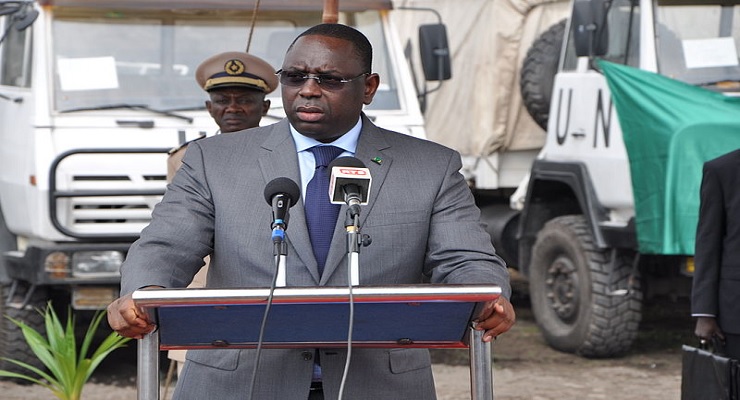
From Voice of America
Senegal’s President Macky Sall is counting on the success of his economic record to propel him to win a second term in Sunday’s elections.
Sall boasted he will win in the first round, without a runoff vote, though some critics say the two biggest threats to his re-election were barred from running.
This stable West African democracy has long been praised for its peaceful transfers of power, a rarity in a region better known for its history of coups and dictators.
Sall, who was elected in 2012, is running as “the builder of modern Senegal.” One billboard notes the 221 kilometers (137 miles) of roads created in his first term. A long-awaited gleaming international airport has opened under his watch that eventually will be connected to Dakar by high speed train.
Sall’s campaign caravan wove through the congested streets of Dakar as crowds lined the capital’s streets to greet his tour bus on Thursday. In the Medina neighborhood, a tailor furiously sewed up last minute dresses with fabric emblazoned with the president’s face. Music blared as the smell of meat wafted over the crowds from a nearby djibiterie, a traditional grill restaurant.
“He’s done a lot for Senegal, especially for the young people,” said Khady Mbaye, 49, dressed from head to toe in the Macky Sall fabric. “The water flows normally — we don’t have the outages like we used to.”
Mbaye says more of her relatives are working now than seven years ago and that’s what the president is hoping will allow him to win a second term Sunday without a runoff. If re-elected he will serve five years because the term has been shortened under the law.
Sall, 57, has claimed credit for creating some 491,000 jobs during his first term and is vowing to add 1 million more if elected to another term. The country’s annual GDP growth was 7.2 percent in 2017.
The opposition candidate seen as his biggest challenger, though, says too many Senegalese remain mired in poverty despite those gains. An untold number of young Senegalese men still seek economic migration to Europe and North Africa, often risking their lives in rickety boats across the sea or in sweltering trucks across the Sahara and never coming home.
“In the seven years of Macky Sall’s leadership, poverty has grown in Senegal,” Idriss Seck, a 59-year-old former prime minister, told supporters this week. He is widely believed to pose the greatest challenge to the incumbent — though he has run for president twice before and only garnered 8 percent of the vote last time in the first round.
A potential wildcard candidate is Ousmane Sonko, a 44-year-old former tax official who has galvanized young people with his promises of making government more accountable and transparent.
Makha Mbengue, 33, says he voted for Macky Sall in 2012 but would be casting his ballot for Idrissa Seck this time. Over the last seven years, Mbengue has married and now has a baby on the way. Still, he says he’s no better off than when Sall was elected — he’s still self-employed, running an upholstery cleaning business.
“The first time we had hope for him. He was going to change Senegal but once elected he was a disappointment,” Mbengue said.
Dakar, Senegal’s seaside capital, is home to U.N. offices, 4G internet and luxury beach hotels while much of rural Senegal is without electricity and travel is often by horse-drawn cart. Only 38.3 percent had access to electricity in rural areas as of 2016, according to World Bank statistics.
Whether the opposition can force Macky Sall into a second round will also depend on whether the four challengers can draw votes from the supporters of the two eliminated opposition figures.
Senegal’s constitutional council rejected the candidacy of Dakar’s popular former mayor Khalifa Sall, who is currently serving a five-year prison sentence on charges of misusing public funds. He and his supporters have called those charges politically motivated, designed to keep him from seeking the presidency.
Karim Wade, the son of Senegal’s former president whom Macky Sall defeated in 2012, also was blocked from running because the court said he wasn’t a registered voter. The younger Wade has been in self-imposed exile in Qatar since he was released from jail in 2016 after serving three years on corruption charges. He had been widely expected to run under the banner of his father Abdoulaye Wade’s party, which in the end did not field a candidate. The elder Wade has called for a boycott of the election, though his influence has waned since leaving office in April 2012.
Seyni Mbengue, 43, was a supporter of Khalifa Sall and now is backing Idrissa Seck or “Idy.” She blames the president for keeping her candidate out of the race and hopes he will be defeated.
“Macky Sall has dug his own grave because the opposition has regrouped against him,” she said.
Leave a Reply